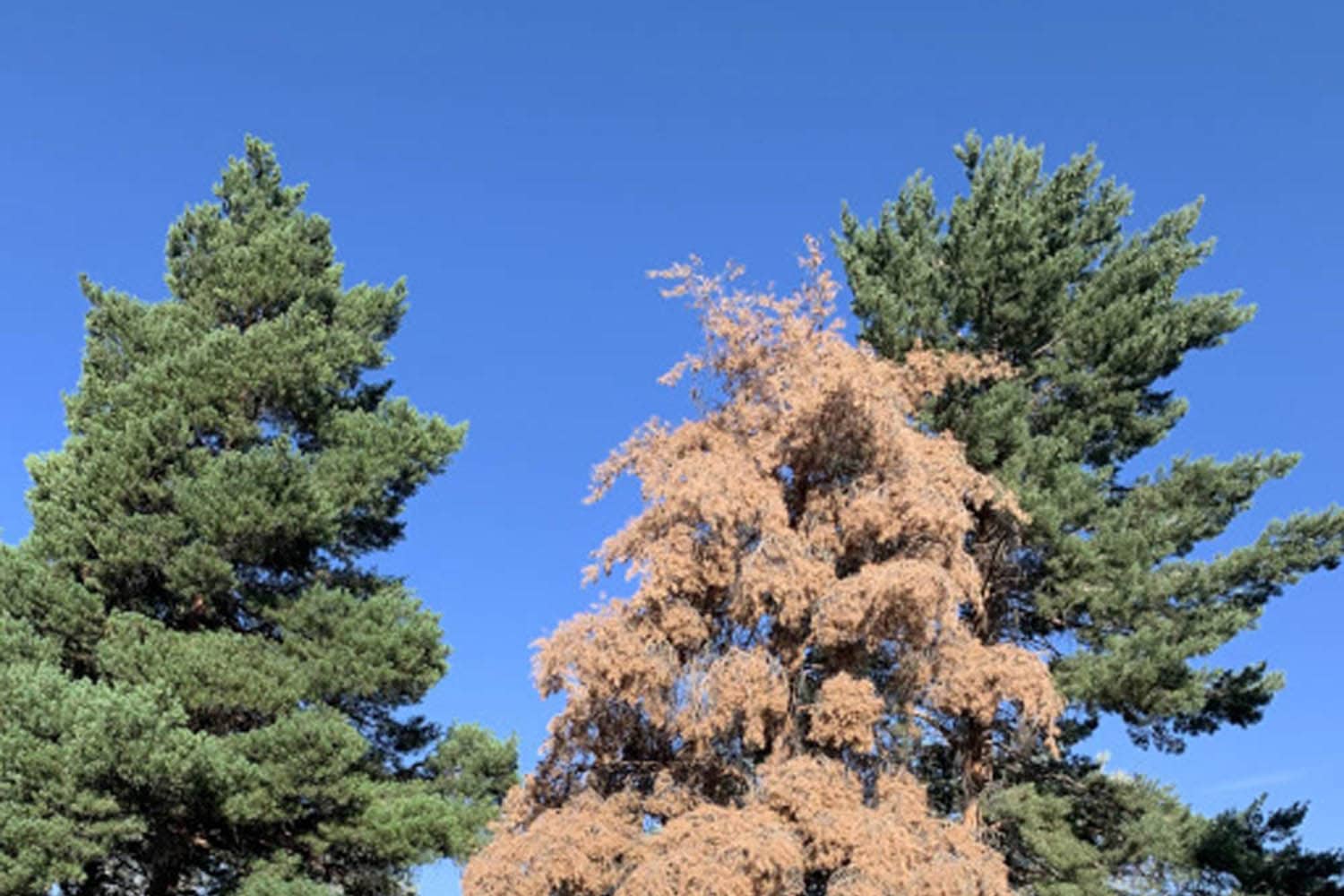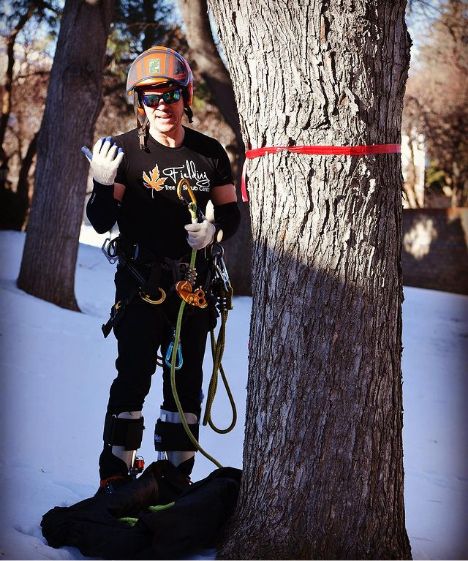Evergreen trees are those that keep their leaves all year round instead of shedding them seasonally. The most common types of evergreen trees that you will find around the Denver area are pine, spruce, fir, juniper and cedar.
As Denver’s climate continues to change, evergreen trees are seeing an increase in pests and environmental stress. These pests can cause significant damage if not treated regularly. Here, we will discuss the most common pests that infest Denver’s evergreens, as well as the damage they can cause, and a few preventative measures you can take with evergreen tree care and maintenance to keep your landscape healthy and thriving.
Evergreen Trees: Mile High City and Across the Front Range
Denver is home to a variety of evergreen tree species such as Concolor Fir, Blue Spruce, and Austrian Pine, to name a few. These trees are an important part of our city’s landscape and provide many benefits such as shade, oxygen production, and carbon sequestration. However, Denver’s evergreen trees are under threat from a variety of pests that can cause significant damage—often making it necessary for homeowners to seek tree service Denver experts to diagnose issues and protect their evergreens.
Pests That Prey On Evergreens in Colorado
Two of the most common pests that target evergreen trees in Denver are the IPS Beetle and the Pine Wilt Nematode.
IPS Beetle
The IPS Beetle is a small, wood-boring beetle that attacks a variety of evergreen trees. These beetles most commonly attack Blue Spruces and Ponderosa Pines, but any drought-stressed pine or spruce is a beacon to these veracious pests. This includes many of the common varieties planted on Denver properties, such as Douglas fir, Engelmann Spruce, and Ponderosa Pine, Austrian Pine, and Norway Spruce. The IPS Beetle causes damage by feeding on the inner bark of trees which causes them to slowly starve to death.
Pine Wilt
The Pine Wilt Nematode is a microscopic worm that attacks the vascular system of evergreen trees, preventing them from transporting water and nutrients throughout their bodies. This results in the tree’s needles turning brown and eventually dying. The Pine Wilt Nematode is most likely to attack non-native and/or exotic pines, as native pines are naturally resistant unless exceptionally drought-stressed. Specifically, some of the exotic, non-native pines to keep a close eye on include: Scotch Pine, Austrian Pine, Eastern White Pine, etc.
Both of these pests are native to Colorado and can be found in many Denver evergreen trees. Pests typically emerge in late spring and early summer, causing significant damage to evergreen trees before they are even noticed.
To prevent these pests from harming your Denver evergreen trees, it is important to regularly inspect them for signs of infestation and stress. If you notice any browning needles or branches, call one of our certified arborists to investigate!
Here are some tips for doing routine checks of your evergreens on your own:
- Look for any browning needles or branches.
- Check for signs of chewing or other damage to the bark.
- Inspect the tree’s roots for any unusual growth.
- IPS Beetles are small and brown, about the size of a grain of rice.
- The Pine Wilt Nematode is too small to see with the naked eye, but look for symptoms like: sudden wilting or dying of branches, yellowing needles, resin oozing from the trunk or branches.
If you notice anything suspicious, call a certified arborist right away. If you think your Denver evergreen tree may be infested with a pest, there’s no time to waste. They will be able to properly diagnose the problem and recommend a course of treatment.
Evergreen Trees Are Sustaining Serious Damage
You may be wondering, how serious is a pest infestation? The truth is, these insects can deal serious damage to your trees. For example, IPS Beetles tunnel through the bark of trees, causing them to slowly bleed to death. This “sapwood staining” is a sure sign that your evergreen is infested with IPS. As another example, the microscopic Pine Wilt Nematode worms invade the evergreen through open wounds in the bark. The nematodes travel up to the needles where they block the flow of water and nutrients, causing the tree to wilt and eventually die.
Trees that are already under stress from drought, poor nutrition, physical damage, extreme temperatures, and poor air quality all contribute to tree stress and make trees more susceptible to these pests. This is why it’s so important to take proper care of your trees year-round. Strong and healthy trees are more resilient and have the ability to fight off infestation.
Regular Evergreen Tree Care
Proper evergreen tree care is key to preventing pests from damaging Denver evergreen trees. Routine pest prevention, trunk injections, and soil drenching can help Denver evergreens stay healthy and strong, making them more resistant to pests. Denver evergreen trees should also be pruned regularly to remove dead or dying branches that could provide a foothold for pests.
By following these steps, you can help keep Denver’s evergreen population healthy and prevent further environmental damage.
Soil Drenching
One of the lesser known tricks for evergreen tree care is to give your trees a soil drench every few months. A soil drench is simply a process of applying water and nutrients directly to the tree’s roots.
This should be done with a hose-end sprayer or by hiring a professional arborist. Soil drenching is effective because it helps the tree absorb nutrients and moisture more efficiently. Denver evergreens need all the help they can get when it comes to absorbing nutrients and moisture!
Water Denver evergreens deeply and regularly during the summer months to prevent drought stress, which makes them more susceptible to pests and diseases.
Mulching
Mulching is another important step in Denver’s evergreen tree care. Mulch helps retain moisture, prevents weed growth, and insulates roots from extreme temperatures. When applying mulch, be sure to keep it away from the tree trunk to prevent rot. A general rule of thumb is to apply mulch in a ring that is about twice the diameter of the tree’s crown.
Proper Fertilization
Fertilizing evergreens near the Denver area is important to maintain their health, but it’s important not to overdo it. Evergreens are susceptible to fertilizer burn, which can cause browning of the needles. This is a common grievance that our expert arborists can remedy through regular fertilization services that do not cause fertilizer burn. Fielding Tree Care recommends recurring fertilization services at least twice a year. It is best to fertilize evergreens in early spring before new growth begins. When applying fertilizer, be sure to follow the manufacturer’s instructions and water the tree well afterward.
Trunk Injections
Many homeowners have never heard of trunk injections, which is normal because it’s above and beyond basic evergreen tree care. Trunk injections are a preventative measure that helps Denver evergreens stay healthy by delivering insecticides to the woody tissues through the tree’s vascular system.
The trunk injection process consists of drilling small holes into the tree trunk and injecting a preventative solution directly into the tree. This method bypasses the tree’s leaves, which can often be damaged or diseased, and ensures that the chemicals go straight to where they’re needed most – the meat of the tree.
This is not a DIY task. These treatments should be done by a Certified Operator, certified through the department of agriculture to make chemical applications.
Team Up With Our Experienced Arborists
Keeping your trees and plants safe from infestation and disease can feel like a full-time job! Luckily, if you’re near the Denver, Colorado area, you don’t have to tackle evergreen tree care alone. Our team of certified arborists at Fielding Tree Care are here to help. We have years of experience caring for Colorado’s trees and plants, and we’re dedicated to providing the best possible service.
Here are some of the benefits of hiring a professional arborist:
Save Time
Caring for your trees and plants can be time-consuming. Hiring a professional arborist frees up your time so you can focus on other things.
Save Money
Professional arborists have the knowledge and experience to quickly identify and solve problems. This can save you money in the long run by preventing wasting money and effort on ineffective practices.
Save Trees
A healthy tree can live for generations, providing beauty, shade, and habitat for wildlife. A professional arborist can help you keep your trees healthy and prevent them from being damaged or killed by pests, diseases, or poor care.






